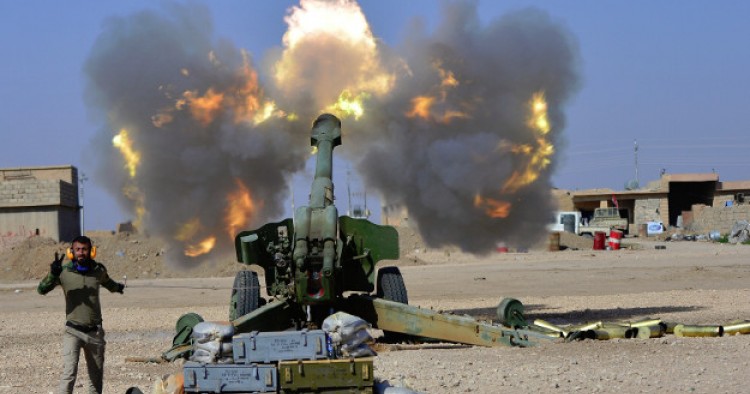Iran-supported units within the Hashd al-Shaabi, the Iraqi paramilitary forces called Popular Mobilization Forces (P.M.F.), have seized the al- Qairawan region in western Mosul from the Islamic State, Iran’s Fars News Agency reported today. Hadi al-Amiri, the secretary general of the powerful Badr Organization and a P.M.F. commander, said the paramilitary forces also managed to capture three villages in western Mosul. Amiri added that the Iraqi Air Force provided air cover for P.M.F. operations in Qairawan and neighboring areas. According to Fars News Agency, which is affiliated with the Islamic Revolution Guards Corps (I.R.G.C.), the P.M.F. launched the second phase of the “Mohammad Rasulullah” operation in western Mosul on May 12 to liberate Qairawan and other areas in western parts of Nineveh Province.
Comment: While the Iraqi security forces are preparing to liberate the strategic city of Tal Afar from the Islamic State, Iran-backed Shiite militia forces have launched a parallel operation – dubbed Muhammad Rasulullah – in western Mosul. The aim of the operation, now in the second phase, is to seize all strategic regions between western Mosul and Iraq’s border with Syria. That will provide the I.R.G.C. strategic supply lines to and from Syria. According to I.R.G.C. media outlets, al-Qayrawan is strategically important for two reasons: First, the area is home to major weapons caches of the Islamic State; and second, the area is “the communication and supply hub between eastern and western parts of Nineveh Province.”
On the Syrian side, the I.R.G.C.-led forces and the Syrian Army have are also pushing forward to reach the border region. Reuters reported last week that P.M.F. Head Falih al-Fayyadh met with Syrian President Bashar al-Assad in Damascus on Thursday and discussed "close and direct" military cooperation against the Islamic State along the shared border. Some P.M.F groups – such as Harakat al-Nujaba and Asaib Ahl al-Haq – are already fighting in both Iraq and Syria under the direction of I.R.G.C. Quds Force Commander Qassem Soleimani.
On Thursday, the P.M.F. forces also captured the Sahl Sinjar airbase, which is about 40 miles east of the Syrian border, provides the P.M.F. forces a “strategic foothold” in western Mosul and helps them to push further toward the Syrian border. Harakat al-Nujaba, an Iran-supported unit within the P.M.F., is reportedly played a leading role in military operations against the Islamic State in Qairawan.
The P.M.F. forces launched the Muhammad Rasullah operation on April 25 and have so far captured several regions from the Islamic State, including the historic city of al-Hadar in western Mosul. The P.M.F. has also begun a joint offensive with the Iraqi army to retake areas between the provinces of Diyala and Salahuddin.
The P.M.F.’s leading role in military operations in western Mosul – particularly the prominent role of Iran-backed units within the P.M.F. – has caused a great deal of concern for Iraqi Sunnis and some regional Sunni states. It is feared that some sectarian groups within the P.M.F. might engage in revenge killing and rights abuses against Sunnis in western Mosul once the Islamic state is defeated.
The P.M.F. consists of militia forces largely from Shiite but also other Iraqi ethnic and religious groups. While some P.M.F. units are Iraqi nationalists and follow Iraq’s top cleric Grand Ayatollah Ali Sistani, many prominent groups within P.M.F. have close ties with Soleimani. What makes Sunnis particularly worried is that, despite P.M.F.’s diversity, it is the Iran-backed militia units within the P.M.F. – such as Asaib Ahl al-Haq, Kata’ib Hezbollah and the Badr Organization – that are playing the most prominent role in western Mosul. These groups have also launched a vicious propaganda campaign against U.S. troops advising Iraqi forces in Mosul and across Iraq.
The Middle East Institute (MEI) is an independent, non-partisan, non-for-profit, educational organization. It does not engage in advocacy and its scholars’ opinions are their own. MEI welcomes financial donations, but retains sole editorial control over its work and its publications reflect only the authors’ views. For a listing of MEI donors, please click here.












